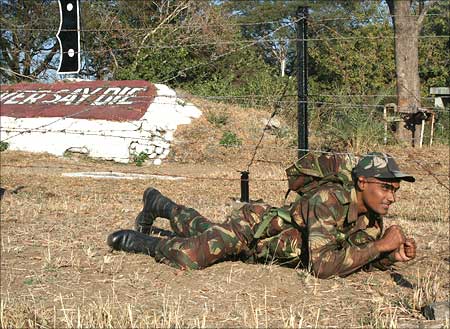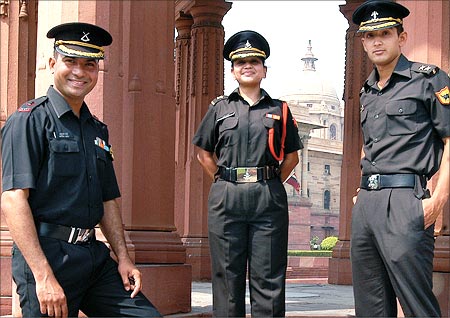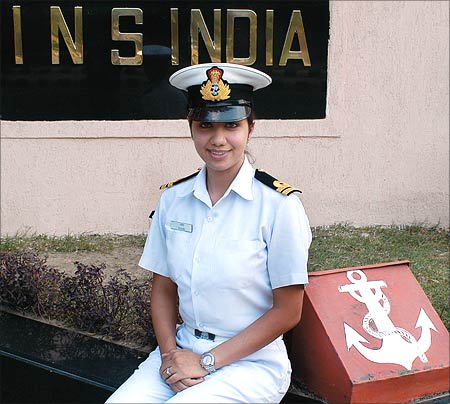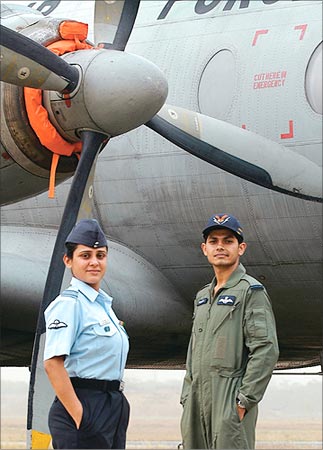
The road to success isn't a long, treacherous route, but, on the other hand, with some foresight and good planning, a rather smooth one. Two months is the time needed to crack the National Defence Academy (NDA), Naval Academy (NA) and the Combined Defence Services Examination (CDSE) says Lt. Col. (Retd.) S K Chhabra of The Cavalier.
The right time to apply
The right time to start preparing for NDA is during the Class 12 summer vacation that is soon after passing Class 11; and for CDSE during the summer break of the final year. No point in waiting to either pass your Class XII or graduation. The eligibility mentioned in the notifications only means that at the time the applicant clears the entrance, he or she should have either passed Class 12 or earned a graduate degree and not at the time of applying!
Choosing the right subjects
While the right timing can save you on missing a chance, planning and choosing the right subjects will decide whether you can join your preferred defence career at all. Say for example, if one wants to be a pilot with the Indian Air Force, then the time to choose the subjects is in Class 11, both for NDA and CDSE as the qualifying subjects for the flying branch in the Air Force are Physics, Chemistry and Math (PCM); for the Indian Navy: Physics and Math. So if you decide to the join the Air Force after college, you would have to plan from Class 11. That early!
"A safe bet is to opt for PCM in case one is considering a career in either the Indian Navy or the Air Force," says aspirant Ashutosh. But there's a bright side for those less inclined towards science subjects.
The qualifying subjects for the Army for both NDA and CDSE could be any stream in Class 12 or any degree in college. Qualifying subjects for the Indian Military Academy (IMA) are Math of Class 10 standard, English and General Studies. But for those mortally scared of Math, they can tick on Officer's Training Academy (OTA) in the form, as the qualifying subjects are English and General Studies. But do keep in mind that OTAs are taken on Short Service Commission (SSC ) which is a service of 14 years (either 10+4 or full 14 years in the case of some branches in the armed forces) and not a full-term service as in the case of Permanent Commission (PC). However, the SSC tenure is extendable depending on the vacancies and the performance of the Officer.
Different entry points
Well, there are many ways of entering the Defence services as you would see from the table. While the NDA/NA, CDSE exams conducted by the UPSC are common for entry into the Army, Navy and Air Force, for the direct entries the three wings on their own screen and select candidates and then send them for SSB interviews. These selections are done under the non-UPSC schemes as you would see in the table. The 10+2 Tech Cadet entry, Technical Graduate Course (TGC), NCC, University Entry Schemes (UES) are some of the non-UPSC entries or direct entry schemes to enter into the armed forces.
While there is no written exam for the direct entries in the case of the Army and Navy, the India Air Force, however, conducts its own tests for direct entries for Technical and Ground Duty branches in the form of the Engineering Knowledge Test (EKT) and the Common Entrance Test (CET). Those who qualify the written test are called for the SSB.
There's no written test for the SSC Flying entry branch, instead shortlisted candidates are directly called for the SSB. Candidates selected through the UES are paid Rs 5000 in the final year of their degree course, that is while they are still in college pursuing their degree. University graduates with NCC 'C' Certificate with minimum 'B' grading and 50 per cent marks in graduation are inducted in the Navy and Air Force as Regular Commissioned Officers and as Short Service Commission Officers in the Army.
Be yourself at the SSB
Honest, motivated young men and women with integrity are the kind of people the armed forces is looking for. "Life in the Forces is tough and we are looking for people with mental stamina," says Col Gill. And these are precisely the qualities candidates are judged on during the five-day SSB interview.
Though it may seem the toughest part, the SSB is the easiest part. The SSB panel assesses candidates in three stages: psychology test, group discussion and a group task. The screening happens on the first of the SSB and those who make it then go through the five-day interview process.
The Pilot Aptitude Battery Test (PABT) for the Flying branch of the Indian Air Force or the Aviation Arm in the Indian Navy takes place on the same first screening day of the SSB. And there is no method to crack this test. "It's just your natural aptitude they test," says Wing Commander Singha, IAF spokesperson. But you take the PABT test just once in your life. So just in case you aren't able to clear the test, there are other branches you could apply to. Above all though, Group Captain Singhal, a psychologist with The Cavalier, says that one's confidence should not be superficial; no false confidence'.
"Be yourself and honest, because, if there's an inconsistency in your answers, it will show you up in the interview," says Major General Kashid.
He also notes that candidates are not assessed for their fluency in English as the focus is on the candidate's outlook, not his language. Personality traits such as aggressive behaviour, dominating attitude, selfishness; tendency to cheat or take shortcuts hurt the candidates chances of qualifying says Group Captain Singhal.
Once the SSB interview is over, candidates then proceed for the medical test, which is a four-to-five day process. And just in case you are failed in the test but are convinced that you are fit then there is a provision to appeal to the Medical Board. Wing Commander Singha, IAF spokesperson was failed in the medical test but he appealed to the Medical Board. "And I got selected!"
Now that you know hot to get into the Indian Armed Forces read on to find out the experience of young officers from the Army, Navy and Air Force.
Careers360, is a complete career magazine

The youngest of the three officers, Lieutenant Gandharv Thakur of 5 Armoured Regiment, patiently listens to his seniors Major Anurag Aiery who's from the Infantry branch and Major Pooja Gupta from Ordnance. And then he finally speaks, "Well, it's the only organisation that looks after you round the clock!"
Lt Thakur joined the Army through the NDA. He is on Permanent Commission (PC); Major Aiery and Major Gupta are Short Service Commission officers. "But I will go for PC, there's no doubt about that!" says Major Aiery who started his career as trainee chef with Oberoi, Bangalore. "Joining the army was the goal of my life."
It is seven-and-a-half years since Major Aiery joined the services, but he doesn't miss his chef days one bit. "There was little respect in that job; in any case, my wife's a better cook!" But chefs these days are celebrities, anchoring TV shows, opening restaurants. "I am no less a celebrity commanding a unit of 120 people!" pat he replies. "And not everyone gets to test, bang and crash T-90!" says Lt Thakur referring to the Russian battle tank he operates.
Major Gupta, who like Major Aiery had trained at the OTA, was an event management executive before she joined the Army. "I would interact with an eclectic mix of people, from IAS officers to upcoming models." But being the daughter of an Army officer, she couldn'tresist the Forces. 'There's an aura to the Forces, and just wearing the uniform lifts my spirits, no matter how stressed I might be."
When she had gone for her 5-day SSB interview she wasn't nervous at all. "But I was," says Major Aiery. It was his only chance as he was close to the age limit barrier. "But the officers make you so comfortable that you don't realise you are being judged at all," points out Major Gupta. Lt Thakur's suggestion for the SSB is that candidates should familiarise themselves with SBB structure but should not 'rehearse the answers'.
"But the kind of bonding that develops in just five days is enough to shake the world," says Lt Thakur who had expected the training at the NDA to be quite rigorous. "But it was a lot of fun!" "Life is tough in the armed forces and the training toughens you and improves your mental stamina," says Major Aiery.
Major Gupta had a stress fracture in the first week of her training at the OTA, "but the support from the group helps you move on," she says. She even broke her back while learning skiing in Gulmarg, Kashmir. She's part of the first women officers skiing team. Major Aiery recommends the Ghatak/commando training he underwent to everyone. "You will be surprised your mind is capable of so much."
But getting those stars at the passing out parade (PoP) is an indescribable feeling. "I cried!" says Major Aiery. Major Gupta's parents failed to spot their daughter. "The uniform is a great leveller, everyone looks the same," says Lt Thakur. Surely the Sixth Pay Commission has brought them cheer. "I joined before the Commission, and my commitment to the Army is just the same," says Lt Thakur. "We are not working here for the money," says Major Gupta, "but for the satisfaction of it!" adds Major Aiery.

Like any teenager, Lieutenant Rashmi of the Logistics branch, wanted to be everything, "but I had an adventure streak in me," says the national level swimmer. In her final year of BA Economics, when many of her friends were deciding their future, Lt Rashmi applied to the Navy.
Though Lt Rashmi is from 'fauji' background; both her father and brother are from the Army, her heart was set on the Indian Navy. "The postings are fantastic! Goa, Cochin, Mumbai, all are happening places!" Commander Deepak Singhal, Directorate, Naval Operations, couldn't agree more. "Indian Navy offers a very cosmopolitan lifestyle; the postings are at the best of the places, rarely in remote places, and this gives us a huge exposure to civilian lifestyle."
Not just that, there are many trips abroad for naval courses and there's an active interaction with foreign navies says Cdr Singhal. But when Cdr Singhal sat for the Naval Academy examinations, it was for the lure of the uniform. "It looks royal," he says and "grand," adds Lt Rashmi.
She went unprepared for the SSB. "The SSB officers, dressed in civilian clothes, at once make you feel at ease." Cdr Singhal says that the SSB is a very scientific process devised by scientists at the Defence Institute of Psychological Research (DIPR). "In fact, it is considered one the best interview formats in the world." Lt Rashmi thinks that even if one doesn't get through the SSB, the experience itself is life-changing.
Lt Rashmi is the second batch of SSC women officers to have passed out from the new Naval Academy at Ezhimala, Kerala. "The moment I stepped into the academy, I felt we were all equal." And no doubt, the place is beautiful she says. "There are mountains, beaches, rivers, and of course, the sea. I played a lot of beach volleyball!" And she's done skydiving, too. "Besides adventure sports, there are plenty of courses to do, as well!" She did diploma in Logistics Management from Symbiosis Institute of Management during her one year training at INS Hamla.
It was during the training that Lt Rashmi learnt much more about the Indian Navy. "It was an eye-opener. You can work at sea on the ship, under the sea in submarines or in the air as pilot and within these there are so many specialisations!" As part of the training, she spent two weeks on the ship. "But I am sure soon women will become a part of the ship crew."
For Cdr Singhal, training at the NA was a process of self-discovery. "I thought I could never run. Now, I am a marathon runner." He had participated in the Singapore Standard Chartered Marathon when he was posted there. But the greatest challenge is commanding a unit of young men at an early stage. 'It is a bit unnerving but also a matter of
great pride!"
Cdr Singhal has served at INS Viraat, flagship of the Indian Navy. "It is a city floating on the waters." Just the distance between his cabin and the operation room was 200 metres. And yes, he would jog two kilometres everyday in the mornings on the ship. The sun setting against the Viraat was phenomenal he recalls and on some days when a few whales leaped out from the blue waters, "it seemed I was in another world!"

The first thing an Indian Air Force officer tells you is that the Air Force 'looks after you very well'. "It's true!" says Flying Officer Neville Vaz. "Even now my senior officers call to see if I am doing fine." "And there are co-locations," says a sprightly Squadron Leader Asha Vashisht, "where if both the partners are serving in the Air Force usually they get posted together."
Even working hours are flexible says Squadron Leader Vashisht who's been married for seven years now. "If my four-year-old daughter is unwell, I am home within minutes or just ask a colleague to look after my child if I cannot come." Vashisth jogs three kilometres every day and swims for at least an hour in the evenings. "There are deer, peacocks, and open spaces for children to play. "And it's very safe," she says as she walks through the verdant, Air Force station at Hindon.
It is from the same station Flying Officer Vaz flies his aircraft. He's a transport pilot. "It's a 24-hour job, but we get a lot of time to ourselves." His colleague Flying Officer Nitin Raj wholeheartedly agrees. Before joining the Air Force, Flying Officer Vaz reviewed gadgets on Hindi news channel, CNBC Awaaz.
He was keen on a TV journalism career and did Media Studies at St Xavier's Mumbai. As no one in his family was in the armed forces, he had never thought of joining the Forces until the mother of a student he taught to support his studies encouraged him to apply. At the time he was preparing for CAT and it helped him clear the CDSE entrance. When he got called for the SSB, he had just got a job at CNBC Awaaz.
But Squadron Leader Vashisht was determined to become a pilot. "Well, I wanted to prove a point to the male community!" she laughs. She was so keen on flying that at 5: 30 in the morning she would cycle to the civilian airport in Bhubaneshwar, Orissa to fly and then reach college by 11 a.m. for her classes. She was studying microbiology. "I would sleep in class!" Despite that she stood 3rd in class.
Much against her father's resistance, she applied to the Air Force and cleared the PABT test. But she failed the medical test. 'I was short by 2 centimetres.' But that did not dampen her spirits. She joined the Administration branch. "Well, I still have the chance to serve my country!" These past several years have been a rollercoaster ride for Squadron Leader Vashisht. "I love to sky-dive." Well, she broke her ankle while landing, and yet with the same foot she has done several demo jumps at melas, promoting the Air Force to young men and women.
For Flying Officer Vaz the PABT test was fun, though he noticed many candidates overdoing it. "One should be just chilled out." But when he cleared the medical exam he was suddenly confused about joining the IAF as he was to have his own show on the channel. "But my boss at CNBC supported my decision."
"To be honest, life in the Air Force is incomparable."